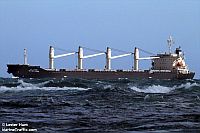 The US Coast Guard in Florida faced an unusual challenge earlier this week. Virtually the entire crew, 19 out of 21, on the 35,362 dwt Korean bulk carrier JS Comet had become seriously ill with symptoms of food poisoning and needed to be rescued. The ship was anchored in the Atlantic three miles off Port Canaveral, Florida while Tropical Storm Arthur raged offshore. The condition of the crew and the 35 knot winds and five to 6-foot seas raised by the tropical storm made evacuation by boat impossible. Despite the deteriorating weather conditions, the Coast Guard successfully evacuate the 19 sick crew members leaving only two crew aboard the ship.
The US Coast Guard in Florida faced an unusual challenge earlier this week. Virtually the entire crew, 19 out of 21, on the 35,362 dwt Korean bulk carrier JS Comet had become seriously ill with symptoms of food poisoning and needed to be rescued. The ship was anchored in the Atlantic three miles off Port Canaveral, Florida while Tropical Storm Arthur raged offshore. The condition of the crew and the 35 knot winds and five to 6-foot seas raised by the tropical storm made evacuation by boat impossible. Despite the deteriorating weather conditions, the Coast Guard successfully evacuate the 19 sick crew members leaving only two crew aboard the ship.
So, what poisoned the crew? The crew told the Coast Guard they believe they got food poisoning from bad sushi. gCaptain reports that an unconfirmed report indicates the crew may have eaten some bad barracuda, which may have been contaminated with ciguatoxin.
Ciguatoxin is a poisonous organic compound created by toxic dinoflagelates which adhere to coral, algae and seaweed, where they are eaten by herbivorous fish who in turn are eaten by larger carnivorous fish. Barracudas, snapper, moray eels, parrotfishes, groupers, triggerfishes and amberjacks, are most likely to cause ciguatera poisoning.
Ciguatera poisoning is nasty and dangerous. Gastrointestinal symptoms include nausea, vomiting, and diarrhea, usually followed by neurological symptoms such as headaches, muscle aches, paresthesia, numbness, ataxia, vertigo, and hallucinations. Severe cases of ciguatera can also result in cold allodynia, which is a burning sensation on contact with cold. Neurological symptoms can persist and ciguatera poisoning is occasionally misdiagnosed as multiple sclerosis. The symptoms can last from weeks to years, and in extreme cases as long as 20 years, often leading to long-term disability.
If the reports are accurate, it seems likely that the fresh barracuda served by the ship’s cook, figuratively at least, may have bitten back.

The larger the fish the greater the opportunity for ciguatera poisoning. Small barracuda present less of a risk. Several decades ago while fishing out of Euluthra (?) Island we would catch large barracuda and bring them back but not eat them. The Captain said “just leave them on the pier and they will be gone by morning.”
The local population was just about starving and ate them, ciguatera or no.
The larger the fish the greater risk for mercury and other nasty poisons.
We had a boat growing up and fished anytime the weather permited, I hated fish.
To this day I very seldom eat it.
Grew tired of lobster and crab, as for shellfish, only once in a great while, maybe yearly if that.
By the way, did they say what the cargo was?